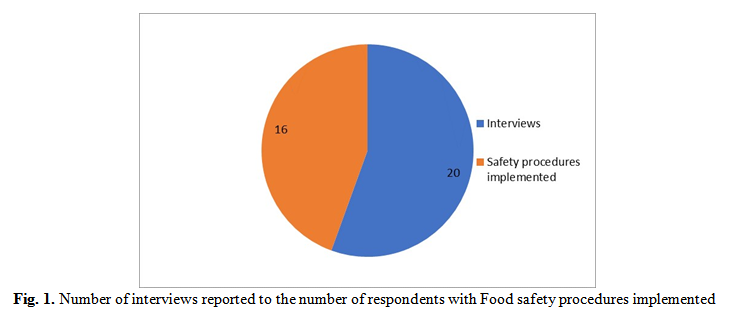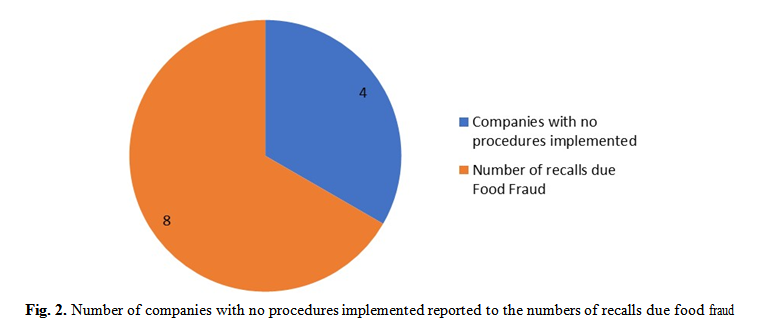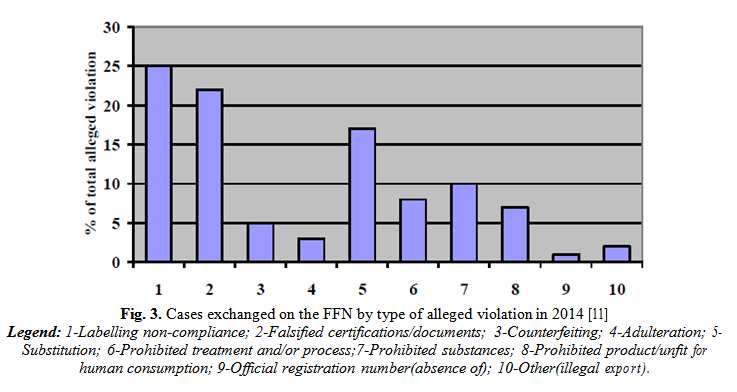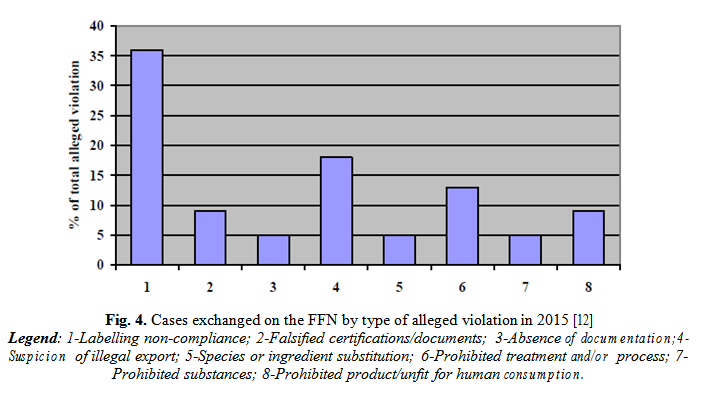Food defense, ethics and food fraud

Abstract
The potential of this study is to investigate issues regarding potential application of Food Defense concepts for Food Industry. While the legal regulations regarding food safety, food risks and food borne illnesses are considerably varied and applicable, less is known about the ethical treatment of the subject.
Food Safety refers to a potential accidental hazard (physical, chemical or microbiological) that may occur and Food Defense concern a hazard that may be intentionally introduced, including by acts of terrorism.
Ethics of food safety is a dynamic area that continues challenging our perceptions of food consumption, health risks, and public responsibility for food borne illness. Food ethics may involve, for example, genetically modified organisms used in food (GMO), incorrect labeling or food fraud (substances that can change the composition or interfering with the biological states or processes in food).
Ethics will have a great contribution to food safety in all three levels of risk analysis of food: risk assessment, risk management, and risk communication.
The study is based on an exploratory research. A qualitative approach based on interviews with the Managers from Food Industry. Other secondary data were collected through laboratory tests applicable.
We find out that the companies with Food Safety procedures and a Food Defense Plan implemented are more protected towards Food Fraud than the companies with the procedures and plan not implemented.
Table Of Contents:
1. Introduction
2. Ethics and Genetically modified organism
3. Methodology
4. Results and discussion
5. Conclusions
1. Introduction
The potential of this study is to investigate issues regarding potential application of Food Defense concepts based on ethics and protected against food fraud.
The approach is based on a study cases which implements Food Safety procedures that are more open to ethics principles and then protected against Food Fraud or incorrect labeling, etc.
Food Safety refers to a potential accidental hazard (physical, chemical or microbiological) that may occur and Food Defense concern a hazard that may be intentionally introduced, including by acts of terrorism.
The paper explores in an analytical manner, the factors that can influence the implementing of a Food Defense Plan in Food Industry with focus with the commune elements specific for Food Safety Procedures already implemented.
For implementing a Food Defense Plan 3 major conditions must be implemented: Regulation, Food Safety Procedures and a Contingency Plan.
A Food Defense Plan should be implemented based on Assessment Vulnerability – a process used to identify specific points in the food supply chain where intentional contamination has the greatest potential to cause economic and public health harm or to identify and prioritize the weaknesses (vulnerabilities) in a specific food operation chain.
Food Defense is an improvement for Food Safety Procedures. Food Safety represents one of the most important topics for Food Industry.
According to Kass (2001) bioethics in general, and codes of medical and research ethics specifically, give high priority to individual autonomy, public health ethics address the social justice functions of public health, most notably its affirmative obligations to improve the public health and reduce certain social inequities [1]. Public health pays an important contribution to protect citizen’s health through public health policies, laws and procedures based on risk analysis [2].
Ethics will have a great contribution to food safety in three levels of risk analysis: first stage-risk assessment with value judgments in the process of risk assessment, the second-risk management, involving the process of weighing policy and technological alternatives to accept, minimize, or reduce assessed risks, to select and implement options by facilitate decision making, and the third stage, risk communication. Other contribution of ethics on risk management includes risk reduction [3].
These principles and values of public health ethics will also help balance various proposals to deal with the scientific food risk and determine the best (or least harmful) solution. These principles and values include the salience of population health, safety, and welfare; fairness and equity in the distribution of services; and respect for the human rights of individuals and groups [4].
Ethics of food safety is a dynamic area that continues challenging our perceptions of food consumption, health risks, and public responsibility for food borne illness. Food ethics may involve, for example, genetically modified organisms used in food (GMO), incorrect labeling or food fraud (substances that can change the composition or interfering with the biological states or processes in food).
2. Ethics and Genetically modified organism
According to European legislation, the content of genetically modified organisms (GMOs) in a food or feed product has to be expressed as a relative quantity linked to the DNA of the ingredient (biological species). [5]
Foods derived from genetically modified (GM) crops include fruits, vegetables and grains and are the result of a process by which foreign genes are spliced into a related or nonrelated species resulting in a genetically modified organism. In US they are an important part of the food chain, while in EU are controversy exhibited.
In EU introduction of new GM food products must have approval must from the European
Commission in consultation with the European Food Safety Authority.
If approval is given, the new GM food product is then subject to confirmation by a committee of national experts and their respective environmental ministers. If this confirmation is not obtained, the matter of approval then returns to the European Commission for a decision. However, this is not an ultimate decision as each of the individual countries can then over-rule the decision of the European Commission and institute a ban on a national basis [6]. As a result, is neat the absence of GM food products in the retail marketplace.
Thus, a mandatory GM food labeling are largely centered on health-related concerns, environmental concerns, and the rights of consumers to product information.
The controversy in Europe arises from consumer fear of the potential negative long-term impacts on human health and the environment or concern over safety, altered nutritional quality, and the possible creation of new viruses and toxins or concerns related to the potential negative impacts on the environment [7].
For example, of NGOs during the 1980s and 1990s were first introduced as medicinal products. Genetic modification of food and food products further intensified the debate surrounding genetic modification. Food’s far-reaching impact and the broad need to fulfill human and livestock nutritional requirements ensure the debate will engender critical interest on both sides of the issue.
In turn, the controversy about the genetic modification of food has spawned differing views regarding labeling policies for genetically modified (GM) foods. This debate regarding GM food labeling policy has brought about a divide over GM food labeling requirements between proponents and opponents of GM foods, including governments, individual companies and activist groups [8].
Active civil society processes and, more generally successful notions of the consumer movement, create public pressures leading to food law reforms and to the acknowledgment of legal rights to consume better food.
Ethics and incorrect labeling
Consumers have much less knowledge about the foods they buy than suppliers, and so accurate food labeling is important as a communication tool between suppliers and buyers [9].
Food fraud
The types of food fraud include adulterant-substances (adulteration), substitution, dilution, stolen goods, tampering, diversion and gray market product, smuggling, unauthorized product or unauthorized re-filling, misrepresentation or mislabeling, and intellectual property rights counterfeiting.
3. Methodology
The study is based on an exploratory research. A qualitative approach based on interviews with the Managers from Food Industry. Other secondary data were collected through laboratory tests applicable.
Most of the questions are linked with safety food procedures and connection with ethics and genetically modified organism, incorrect labeling or food fraud.
4. Results and discussion
Analyzing the interviews, the studies cases with 20 managers, only 16 declare that they have Food safety procedures implemented.

From the implemented one, only 2 cases of incorrect labeling and addition of preservatives where reported, but due applicable procedures where corrected.
Analyzing the responses of the managers with no procedures implemented, we found out that some cases 8 of food fraud where reported and the products where recall from the markets.

Based on Pilot Project EIR report’ Analysis of food integrity in Romania, in 2015 [10], the top 10 of products most at risk of fraud in the Romanian food sector is: Olive oil, Fish, Organic food, Milk, cereals, Honey and maple syrup, Tea and coffee, Spices, Wine and Certain fruit juice.
Analyzing the Food Fraud Network reports we find out that most incorrect labeling cases are connected with (place of origin; addition of water; dates; health claim; nutrition claim; denomination; ingredients; treatment and/or process; weight and/or volume; others) is the principal cause of the alleged violation in 2014 and 2015, followed by falsified documents, substitution, prohibited substances (additives; growth promoters; pesticides; veterinary medicines; others) and the suspicion of illegal export. The dates will be exemplified in following pictures.


5. Conclusions
Ethics of food safety is a dynamic area that continues challenging our perceptions of food consumption, health risks, and public responsibility for food borne illness. Ethics will have a great contribution to food safety in all three levels of risk analysis of food: risk assessment, risk management, and risk communication. The exact role that ethics will play in safeguarding food safety will depend on the centrality and effect of public health law, the satisfactory function of public institutions, public movements and policies, and the extent to which law promotes each of these levels in analyzing food risks [3].
We find out that the companies with the similar quality principles and practices for Food Safety are more open to implement a Food Defense Plan.
The Authors:
BELOUS Mădălina [1]
AMFIM Adriana [1]
SIMION Violeta-Elena [1]
[1] Spiru Haret University, Faculty of Veterinary Medicine (ROMANIA).
Contributo selezionato da Filodiritto tra quelli pubblicati nei Proceedings “13th National Conference on Bioethics with International Participation - 2018”
Per acquistare i Proceedings clicca qui.
Contribution selected by Filodiritto among those published in the Proceedings “13th National Conference on Bioethics with International Participation - 2018”
To buy the Proceedings click here.



